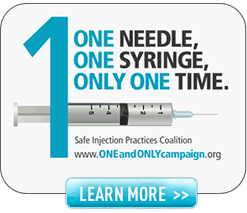It has been almost five years since many of my fellow Coloradoans and I were wondering if we would be okay, if we would live. I had learned of my hepatitis C diagnosis months earlier than the others, as I was symptomatic, most of the victims were not. I kept asking how this could happen to me, all the while fearing that it wasn’t just me suffering. I feared for my future. I feared for the future of my daughter, Lucy, who was just one year old. A few months later, in July 2009, we learned that Kristen Parker, one of three known drug diverters in recent years to infect patients, had been the source of this deadly disease. Thousands of letters went out to patients who may have come into contact with Kristen and therefore put into harms way.
Unbeknownst to me at the time, I was following in the very brave footsteps of Evelyn McKnight and HONOReform. So with the support of some vital people, I tried to make a difference. I could not stay silent. I spoke to media and told my story and the story of the outbreak. I tried to put a name and a face to this tragedy, as some of the victims were too ill to speak out for themselves. Soon some Colorado lawmakers approached me to work with them to help make some real changes. And we did! I am proud of the two bills that were passed in 2010 HB 1414, concerning the reporting Identity in Injectable Drug Diversion (Benefield/Foster) http://tornado.state.co.us/gov_dir/leg_dir/olls/sl2010a/sl_338.htm and
HB 1415, Sunrise Surgical Tech Registration (Gagliardi/Morse) http://tornado.state.co.us/gov_dir/leg_dir/olls/sl2010a/sl_339.htm.
Our friends in New Hampshire, led by lawmaker Tom Sherman, an MD, are going one step further in response to the happenings surrounding the 2012 Exeter Hospital outbreak. I look forward to the opportunity to announce their new bills, as soon as they’re passed.
And now, with HONOReform, with whom I am now allied, and many other advocates at our side to include public health leaders, healthcare workers, attorneys, (can’t believe I am lucky enough to be partnering with such wonderful and caring folks) we are working toward making more changes at a national level. Drug diversion is an ongoing problem which few have chosen to talk about. In fact, even with the ever-present problem among all types of healthcare facilities, there are many working within the industry who truly do not know or want to acknowledge this growing dilemma. We are far overdue for a serious and sustained response this national crisis.
Throughout the U.S. healthcare system, we need to address this prevailing problem that has hurt so many of us. And part of the issue is actually to help the drug diverter. It is too easy for addicts who work in healthcare to get their hands on drugs. It hurts patients. It hurts their fellow employees. But it also continues to hurt the addicted healthcare worker. Yes, they are breaking the law and in many cases are withholding pain medication from patients in need. Yes, they are harming patients, but they can be not only stopped but also helped.
One of my colleagues told me over lunch that when she and her institution catch a healthcare worker diverting drugs, that person will almost always thank her for catching him or her. For without the threat of losing their licensure (or worse), they may have never reached out for help.
I wish I could tell you in detail about the two meetings I attended in Washington, DC, on Thursday January 23rd. Before too long, I will be able to reveal our plans, our forthcoming work, on drug diversion prevention.
For now, suffice it to say that we met with Dr. Ron Valdiserri, Deputy Assistant Secretary for Health, Infectious Diseases, for the U.S. Department of Health and Human Services. I am very grateful for Dr. Valdiserri and his colleagues, some of whom joined us by phone to hear our ideas on preventing drug diversion and listen to my story, for not only his time and kind attention, but for his true concern around this issue and his suggestions and honesty. I look forward to continued work with him and his associates.
Later in the day several other colleagues joined our contingent on the phone as we proceeded to speak with a smart and committed healthcare reporter. He listened to our stories and perspectives as he busily took notes beside me. He probed and asked a series of detailed questions. My fingers are crossed. I am hopeful that the first full-length journalistic piece on drug diversion will be in print before too long. This article, no doubt, will have a huge impact.
As we solidify our plans and launch and sustain them throughout the country, I will keep you informed.
For now, I would like to ensure everyone who has been impacted by drug diversion throughout the United States that we are engaged on a variety of levels to provide a national movement to address, once and for all, drug diversion and ways to prevent it. This is going to take a lot of time, a lot of work. But I am up for the challenge. It has been almost five years for me and I am not willing to give up on this cause. Finally, I feel as though my voice, joined with those of my esteemed colleagues and friends, is being heard.
The gratitude for my health and the ability to speak up is never lost. Again, many thanks to my colleagues, who came to Washington from all over the country to join us to make a difference. On behalf of my fellow patients, we are moving forward….



Interesting read…proud of Lauren for this.
Proud of you Ms. Lauren ~ will be eager to hear the developments